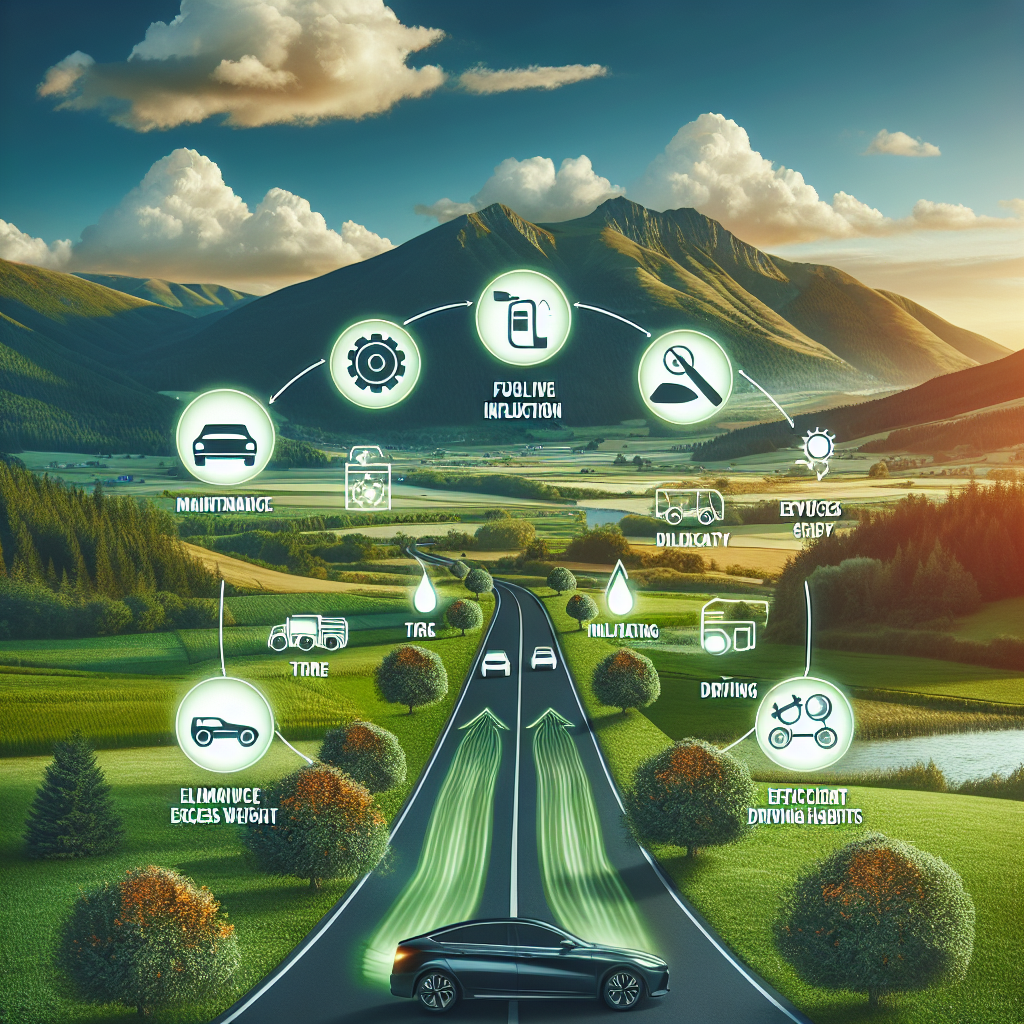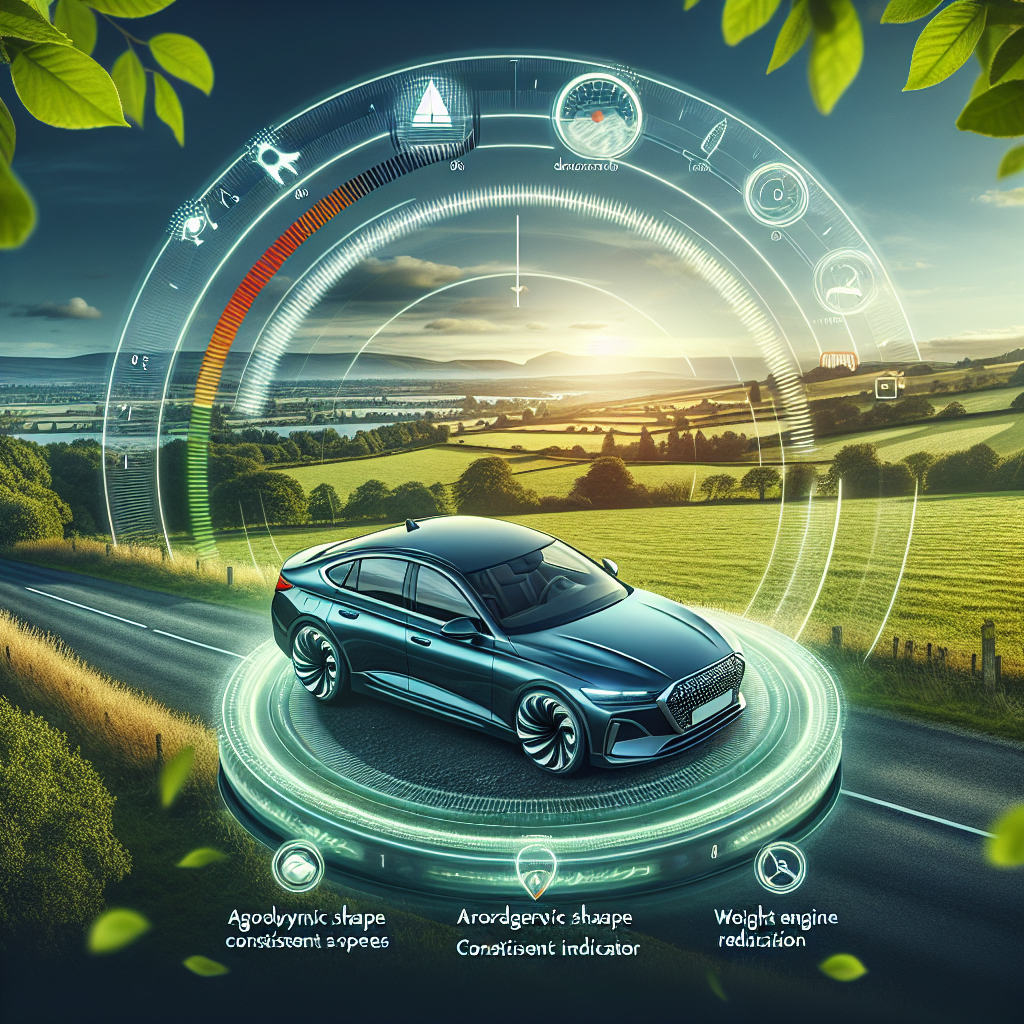5 Simple Tips for Improving Fuel Efficiency in Your Car
As gas prices continue to rise, many car owners are looking for ways to improve their fuel efficiency and save money at the pump. Fortunately, there are several simple tips that can help you get the most out of every gallon of gas. By following these tips, you can not only save money, but also reduce your carbon footprint and contribute to a cleaner environment.
1. Keep Your Tires Properly Inflated
One of the easiest ways to improve fuel efficiency in your car is to make sure your tires are properly inflated. Under-inflated tires can decrease your gas mileage by up to 3%, as they create more resistance and require your engine to work harder. This not only wastes gas, but also puts unnecessary strain on your car’s engine. On the other hand, over-inflated tires can be just as harmful, as they can cause your tires to wear out faster and decrease your car’s handling and braking abilities. To find the optimal tire pressure for your car, check your owner’s manual or the sticker on the inside of your car door. Make sure to check your tire pressure regularly, especially before long trips.
2. Avoid Excessive Idling
Idling your car for long periods of time not only wastes gas, but also contributes to air pollution. If you’re going to be stopped for more than 30 seconds, it’s more fuel-efficient to turn off your engine and restart it when you’re ready to go. This is especially important in traffic or at drive-thrus. Additionally, avoid warming up your car for more than a minute in the winter. Modern cars don’t need to be warmed up for long periods of time, and idling for too long can actually damage your engine.
3. Use Cruise Control on the Highway
Using cruise control on the highway can help you maintain a consistent speed, which can improve your fuel efficiency. This is because constantly accelerating and decelerating uses more gas than maintaining a steady speed. Cruise control also helps you avoid speeding, which not only wastes gas, but also puts you at risk for getting a ticket. However, it’s important to note that cruise control is not recommended for driving in hilly or mountainous areas, as it can cause your car to downshift and use more gas.
4. Remove Excess Weight
The more weight your car carries, the more gas it needs to move. Therefore, it’s important to remove any unnecessary items from your car, such as heavy tools or sports equipment. For every extra 100 pounds in your car, your fuel efficiency can decrease by up to 2%. This may not seem like a lot, but it can add up over time. So, take some time to declutter your car and only keep the essentials.
5. Plan Your Trips Wisely
Planning your trips wisely can also help improve your fuel efficiency. Combining multiple errands into one trip can save you time and gas. Additionally, try to avoid rush hour traffic, as stop-and-go driving can significantly decrease your fuel efficiency. If possible, consider carpooling or using public transportation to reduce the number of cars on the road and save on gas.
In conclusion, improving fuel efficiency in your car doesn’t have to be complicated or expensive. By following these simple tips, you can save money, reduce your carbon footprint, and contribute to a cleaner environment. Remember to regularly maintain your car, drive responsibly, and make conscious choices to reduce your gas consumption. With these small changes, you can make a big impact on your wallet and the planet.
The Importance of Regular Maintenance for Fuel Efficiency

Fuel efficiency is a crucial aspect of car ownership, not only for the sake of saving money on gas but also for the environment. With the rising cost of fuel and the increasing concern for the planet, it has become more important than ever to improve the fuel efficiency of our cars. While there are many factors that contribute to a car’s fuel efficiency, one of the most significant is regular maintenance.
Regular maintenance is essential for keeping your car in top shape and ensuring that it runs efficiently. Neglecting maintenance can lead to various issues that can significantly impact your car’s fuel efficiency. For instance, a dirty air filter can reduce your car’s fuel efficiency by up to 10%, while a faulty oxygen sensor can decrease it by 40%. These are just a few examples of how neglecting maintenance can affect your car’s fuel efficiency.
One of the most critical maintenance tasks for improving fuel efficiency is changing the oil regularly. The oil in your car’s engine acts as a lubricant, keeping all the moving parts running smoothly. Over time, the oil breaks down and becomes less effective, leading to increased friction and wear on the engine. This, in turn, can cause your car to use more fuel to compensate for the decreased efficiency. By changing the oil regularly, you can ensure that your engine is running at its best, thus improving fuel efficiency.
Another crucial aspect of regular maintenance is keeping your tires properly inflated. Underinflated tires can increase fuel consumption by up to 3%, as they create more rolling resistance, making the engine work harder. On the other hand, overinflated tires can also decrease fuel efficiency and affect the handling of your car. It is essential to check your tire pressure regularly and keep them inflated to the recommended level for optimal fuel efficiency.
In addition to these maintenance tasks, it is also crucial to keep your car’s engine tuned. A well-tuned engine can improve fuel efficiency by up to 4%, as it ensures that all the components are working together efficiently. This includes checking and replacing spark plugs, fuel filters, and other engine components as needed. A poorly tuned engine can lead to decreased fuel efficiency and even more severe issues in the long run.
Regular maintenance also involves checking and replacing other essential fluids in your car, such as transmission fluid, coolant, and brake fluid. These fluids play a crucial role in keeping your car running smoothly and efficiently. For instance, low transmission fluid can cause your car to shift gears more frequently, leading to increased fuel consumption. Similarly, low coolant levels can cause your engine to overheat, which can also affect fuel efficiency.
Aside from these specific maintenance tasks, it is also essential to keep your car clean. A dirty car can create more drag, making the engine work harder and use more fuel. Regularly washing and waxing your car can help reduce drag and improve fuel efficiency. Additionally, removing any unnecessary weight from your car, such as heavy items in the trunk, can also help improve fuel efficiency.
In conclusion, regular maintenance is crucial for improving fuel efficiency in your car. Neglecting maintenance tasks can lead to various issues that can significantly impact your car’s fuel efficiency. By changing the oil regularly, keeping your tires properly inflated, tuning the engine, and checking and replacing essential fluids, you can ensure that your car is running at its best and using fuel efficiently. Additionally, keeping your car clean and removing any unnecessary weight can also contribute to better fuel efficiency. By following these maintenance tips, you can not only save money on gas but also do your part in reducing your carbon footprint.
Maximizing Fuel Efficiency: How Your Driving Habits Affect Gas Mileage
Fuel efficiency is a crucial aspect of car ownership, especially with the rising cost of gas and the increasing concern for the environment. Maximizing fuel efficiency not only saves you money but also reduces your carbon footprint. While there are many factors that contribute to a car’s fuel efficiency, one of the most significant is your driving habits. In this article, we will discuss how your driving habits affect gas mileage and provide tips on how to improve fuel efficiency in your car.
The first and most important factor to consider is your speed. The faster you drive, the more fuel your car consumes. According to the U.S. Department of Energy, every 5 mph you drive over 50 mph is equivalent to paying an additional $0.20 per gallon of gas. This is because at higher speeds, your car has to work harder to overcome air resistance, resulting in more fuel consumption. Therefore, driving at a moderate speed can significantly improve your car’s fuel efficiency.
Another driving habit that affects gas mileage is aggressive driving. This includes rapid acceleration, hard braking, and speeding. These actions not only put you and other drivers at risk but also waste fuel. When you accelerate quickly, your car’s engine has to work harder, burning more fuel in the process. Similarly, hard braking wastes the energy that was used to accelerate the car, resulting in more fuel consumption. By avoiding aggressive driving, you can improve your car’s fuel efficiency by up to 33% on the highway and 5% in the city.
Idling is another habit that can significantly impact your car’s fuel efficiency. Many people tend to leave their cars running while waiting for someone or stuck in traffic. However, idling for more than 10 seconds consumes more fuel than restarting the engine. Therefore, if you know you will be idling for more than a minute, it is better to turn off your car’s engine. This simple habit can save you a significant amount of fuel and money in the long run.
Proper maintenance of your car is also crucial in improving fuel efficiency. A well-maintained car runs more efficiently, resulting in better gas mileage. Regular oil changes, tire rotations, and tune-ups can improve your car’s fuel efficiency by up to 4%. Additionally, keeping your tires properly inflated can also make a significant difference. Underinflated tires create more rolling resistance, making your car work harder and consume more fuel. By keeping your tires inflated to the recommended pressure, you can improve your car’s fuel efficiency by up to 3%.
Lastly, your driving route can also affect your car’s fuel efficiency. If possible, try to avoid routes with heavy traffic or frequent stops. These routes require more braking and accelerating, resulting in more fuel consumption. Additionally, using cruise control on the highway can also improve your car’s fuel efficiency. By maintaining a constant speed, your car’s engine can operate more efficiently, resulting in better gas mileage.
In conclusion, your driving habits play a significant role in your car’s fuel efficiency. By driving at a moderate speed, avoiding aggressive driving, minimizing idling, and properly maintaining your car, you can improve your car’s fuel efficiency and save money in the long run. Additionally, choosing the right route and using cruise control can also make a difference. By being mindful of your driving habits, you can not only save money but also contribute to a cleaner and greener environment.










